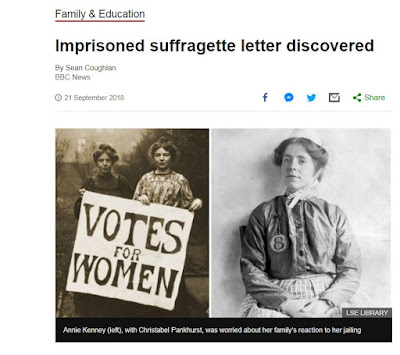Best of the Blog: Great Letters from Jail
Until Halloween, we're using the Monday slot to feature posts from in the early weeks of this blog. This one originally appeared in December. 2019.
Rey Don'tsay, our Saturday Guy, is away on medical leave. While a hospital is not quite a jail, it can feel like one sometimes. I thought of this last week when I came across references to man who used the pen name "Hercules" to write open letters from a 19th century debtors' prison.
Jesse Hawley, aka "Hercules," was a flour merchant who was interested in having raw materials travel to his mill by canals, which would also carry away the finished products to buyers. Hawley was jailed when business matters went badly for him, but incarceration didn't stop him from speaking his mind on the value of building a waterway which would eventually become the Erie Canal. One of these letters was included in a volume of New York history:
And here's a quick summary of Hawley's life and work from "Erie Canal Discovery: The Jesse Hawley Story," a 2007 article by Doug Farley:
Canals are well and good, of course, but other letters from writers in jail spoke of more urgent matters. Dr. Martin Luther King wrote his famous "Letter from Birmingham Jail" in 1963.
Margaret Sanger, five decades earlier, was also a person of strong principle. She was jailed for distributing pamphlets about the use of contraception to working women, many of whom were not healthy enough to continue bearing children without the risk of dying as a result. The following excerpt is from a speech given by Sanger, and not technically a letter, but Sanger was arrested at least eight times, so I think it's legit to add her to this list.
From Sanger's public address:
British jails held their own population of people jailed for their convictions or mode of life. Oscar Wilde's line "All men kill the thing they love" is from his "Ballad of Reading Gaol."
Another bit of British history came to light in 2018 when a letter from the first woman in England to be jailed for participating in a "Votes for Women" march, Annie Kenney, was discovered in Canada. The letter had been written to Kenney's sister in 1905.
Jesse Hawley, aka "Hercules," was a flour merchant who was interested in having raw materials travel to his mill by canals, which would also carry away the finished products to buyers. Hawley was jailed when business matters went badly for him, but incarceration didn't stop him from speaking his mind on the value of building a waterway which would eventually become the Erie Canal. One of these letters was included in a volume of New York history:
Canals are well and good, of course, but other letters from writers in jail spoke of more urgent matters. Dr. Martin Luther King wrote his famous "Letter from Birmingham Jail" in 1963.
Margaret Sanger, five decades earlier, was also a person of strong principle. She was jailed for distributing pamphlets about the use of contraception to working women, many of whom were not healthy enough to continue bearing children without the risk of dying as a result. The following excerpt is from a speech given by Sanger, and not technically a letter, but Sanger was arrested at least eight times, so I think it's legit to add her to this list.
From Sanger's public address:
British jails held their own population of people jailed for their convictions or mode of life. Oscar Wilde's line "All men kill the thing they love" is from his "Ballad of Reading Gaol."
*****











Comments
Post a Comment